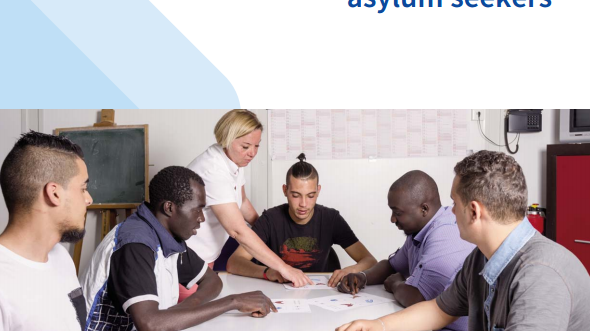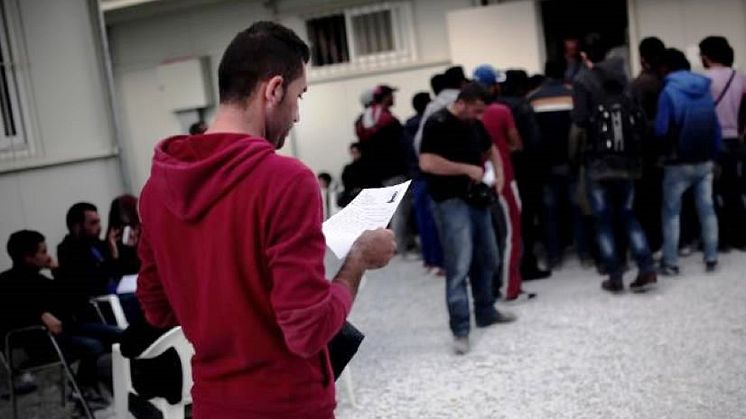
Blog post -
Migrants face long road to integration in Europe’s labour market
On the occasion of Word Refugee Day, Eurofound Research Manager Kára Fóti looks at the difficulties that refugees and asylum-seekers face in finding work and opportunities in Europe.
The refugee crisis has posed significant challenges for Europe – we have not seen such a large-scale migration of people since the Second World War. The exodus from war-torn regions initially posed a humanitarian challenge for frontline countries such as Greece and Italy. However, the longer term challenge around the successful integration of new arrivals is an issue for Europe as a whole. Labour market integration of these new migrants is vital, not only for their social inclusion, but also for Europe’s economic and political cohesion.
The effective and timely integration of new migrants into the labour market has become a prominent issue on the policy agenda in many EU Member States. This is not surprising as, besides facilitating social inclusion, labour market integration is important in order to relieve pressure on social systems, is an economically rational response (to the refugee crisis), and in the long-term can ease Europe’s issues with an ageing population and shrinking workforce. Moreover, effective and sustainable labour market integration can improve social cohesion both locally and in society as a whole – for example, through their workplace colleagues, the newly arrived refugees and asylum seekers can become more involved at community level and in other social activities.
Every EU country has been affected by the refugee crisis, many directly. It is not an issue that is confined to national borders, nor can it be looked at in isolation. Eurofound’s report on the labour market integration of refugees and asylum seekers looks at the practical measures that have been taken in different EU Member States. Clearly, integrating these new migrants within the labour market is not simply a question of skills or legal procedures, but also involves living conditions, geographical distribution, incentives for employers and education.
For example, living conditions in reception centres are often inadequate to prepare people for joining the labour market. Overcrowding and poor conditions are reported, as well as lack of accommodation. And although the geographical distribution of asylum seekers and refugees within individual countries is being planned, there is no guarantee of job opportunities near the reception centres and locations where migrants are being accommodated.
Different situations for refugees and asylum seekers
There can also be stark differences in the situation for refugees (those with the officially recognised status of international protection) and asylum seekers (those who have applied for international protection and are awaiting a decision). Funding for employment services for asylum seekers is often less well established than for those for refugees, and access to these services is not as straightforward. Likewise, social security entitlements for working asylum seekers vary significantly across Member States, and often the rules are less favourable than for other migrant groups, including refugees.
Another vital issue is that of education. Special arrangements for school-age children of refugees and asylum-seekers are not always guaranteed, with some countries reporting capacity problems, saying that schools are ill-prepared to receive this specific group of pupils. This may cause issues with social mobility in the future and reinforce the cyclical nature of poverty and social exclusion.
The volume of newly-arriving asylum seekers since 2015 has resulted in an increased use of temporary asylum. This can weaken refugees’ position in the labour market since it may deter employers from hiring them or offering them longer term contracts as they are reluctant to invest in training.
An issue of access – Not of motivation
Despite these impediments to accessing the labour market, there is a perception in several countries that a lack of motivation to work is the prevailing issue to be addressed, with a number of Member States recently reducing some non-employment-related social services and allowances provided to asylum seekers and/or refugees. However, these measures risk further isolating people from the labour market since it makes it more difficult for those concerned to live in decent conditions. Restrictions on family reunification may have a similar impact, further postponing social (and labour market) inclusion.
Refugees and asylum seekers also face specific challenges and administrative restrictions in becoming self-employed, and in a number of countries measures that aim to facilitate self-employment for refugees are either mainstream initiatives or are targeted at immigrants in general and thus do not take the specific needs of refugees into account.
Despite these ongoing issues, it must be acknowledged that in the key destination countries there is a strong political will to integrate refugees and asylum seekers within the labour market as quickly as possible. A broader consensus is developing that the effective integration of refugees and asylum seekers should be a priority for Europe as a whole. However, we are a long way from this objective, and a concerted effort involving social partners is needed in order to make the effective social and economic integration of refugees and asylum seekers a reality.
Eurofound publications
Approaches to the labour market integration of refugees and asylum seekers:
Download the report or order a copy via the Eurofound website
More information
More on World Refugee Day: UN Website
This article was originally posted on Social Europe





